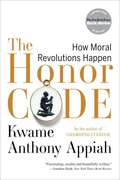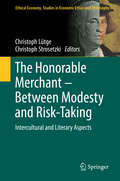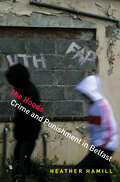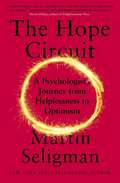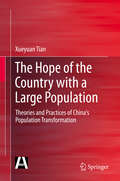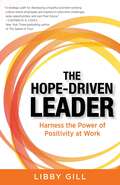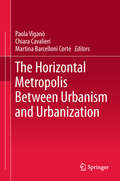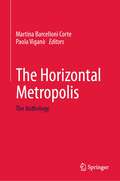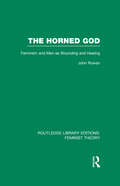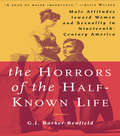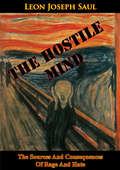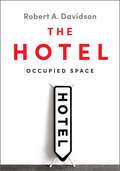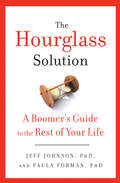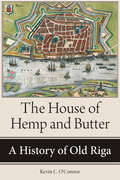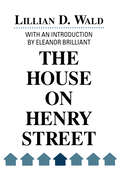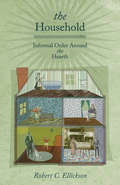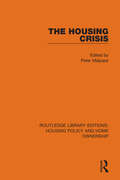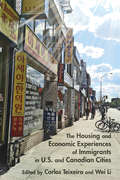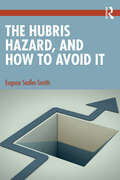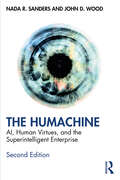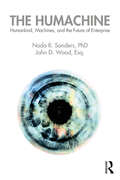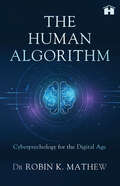- Table View
- List View
The Honor Code: How Moral Revolutions Happen
by Kwame Anthony AppiahA leading philosopher demonstrates the revolutionary power of honor in ending human suffering.
The Honorable Merchant – Between Modesty and Risk-Taking: Intercultural and Literary Aspects (Ethical Economy #56)
by Christoph Lütge Christoph StrosetzkiThis volume explores the concept of the honest merchant, taking a broad perspective and covering a wide range of aspects. It looks at the different types of “honest merchant” conceptions originating from different cultures and literary traditions. The book covers Japanese, Islamic, Scandinavian, Russian, German, Spanish, as well as other aspects, and studies different disciplinary backgrounds of the honest merchant, such as philosophical, economic, neuroethical, sociological and literary ones.The concept of the honest merchant has a long tradition in business ethics. In the Hanseatic League and in medieval Italy, the ideal of the honest businessman was taught since the late Middle Ages. It originated during a time when travelling merchants were often regarded with a sceptical eye. The honest merchants of their time however held clear principles in their business and took responsibility for their community. In later times, the religious notions of the concept lost their pivotal place to reason and morality. This book goes beyond the tradition of discussing business ethics in association with concepts from the Hanseatic League and medieval Italy, and puts the central concept of business ethics in a much greater perspective.
The Hoods: Crime and Punishment in Belfast
by Heather HamillA distinctive feature of the conflict in Northern Ireland over the past forty years has been the way Catholic and Protestant paramilitaries have policed their own communities. This has mainly involved the violent punishment of petty criminals involved in joyriding and other types of antisocial behavior. Between 1973 and 2007, more than 5,000 nonmilitary shootings and assaults were attributed to paramilitaries punishing their own people. But despite the risk of severe punishment, young petty offenders--known locally as "hoods"--continue to offend, creating a puzzle for the rational theory of criminal deterrence. Why do hoods behave in ways that invite violent punishment? In The Hoods, Heather Hamill explains why this informal system of policing and punishment developed and endured and why such harsh punishments as beatings, "kneecappings," and exile have not stopped hoods from offending. Drawing on a variety of sources, including interviews with perpetrators and victims of this violence, the book argues that the hoods' risky offending may amount to a game in which hoods gain prestige by displaying hard-to-fake signals of toughness to each other. Violent physical punishment feeds into this signaling game, increasing the hoods' status by proving that they have committed serious offenses and can "manfully" take punishment yet remained undeterred. A rare combination of frontline research and pioneering ideas, The Hoods has important implications for our fundamental understanding of crime and punishment.
The Hope Circuit: A Psychologist's Journey from Helplessness to Optimism
by Martin SeligmanOne of the most important psychologists alive today tells the story of the transformation of modern psychology through the lens of his own career and change of heart.Martin E. P. Seligman is one of the most decorated and popular psychologists of his generation. When he first encountered the discipline in the 1960s, it was devoted to eliminating misery: the science of how past trauma creates present symptoms. Today, thanks in large part to Seligman's own work pioneering the Positive Psychology movement, it is ever more focused on the bright side; gratitude, resilience, and hope.In this his memoir, Seligman recounts how he learned to study optimism; including a life-changing conversation with his five-year-old daughter. In wise, eloquent prose, Seligman tells the human stories behind some of his major findings. He recounts developing CAVE, an analytical tool that predicts election outcomes (with shocking accuracy) based on the language used in campaign speeches, and the canonical studies that birthed the theory of learned helplessness - which he now reveals was incorrect. And he writes at length for the first time about his own battles with depression at a young age.All the while, Seligman works out his theory of psychology, making a compelling and deeply personal case for the importance of virtues like hope, anticipation, gratitude, and wisdom for our mental health. You will walk away from this book not just educated but deeply enriched.
The Hope of the Country with a Large Population
by Xueyuan TianChina has the largest population in the world. However, according to the United Nations, India and China are expected to simultaneously reach a population of approximately 1. 38 billion by 2030, with India taking a slight lead. China will be all too happy to surrender its position as the country with the largest population. Where does this attitude come from? For China, this situation is symbolic of the solution to the excessive population and a milestone in the "Three-Stage" population development strategy, as well as the people's hope. In order to realize this hope, it firstly depends on the transformation from the previous high birth rate, high death rate, and low growth rate of population, to a high birth rate, low death rate, and high growth rate, and finally to a low birth rate, low death rate, and low growth rate. It also relies on the "post-demographic transition" to a low fertility level since the 1990s, and secondly, is closely related to the population change in the future. Therefore, in-depth studies on population and the development of population, resources, environment, economy, and society should be conducted on the basis of fresh experiences and theories from the international community, in order to move forward with the times to promote the solution to the population problem and realize the dream of rejuvenating the Chinese nation. As a result, population change is linked to this great rejuvenation, as the great rejuvenation requires the population change and, in turn, the population change facilitates the great rejuvenation.
The Hope-Driven Leader: Harness the Power of Positivity at Work
by Libby GillThe business and self-help shelves may be overflowing with success books, but author Libby Gill has found a totally fresh perspective on the topic of leadership: hope. "Libby Gill offers us a roadmap to be positive and hopeful for the future. This is a must-read for those of us ready to embrace true hope!" —Marshall Goldsmith, author of the #1 New York Times bestseller Triggers Zeroing in on what she sees as the defining issue of creating a more purposeful and productive workplace, Gill explains the science of hope theory, which is "the interconnection between beliefs and behaviors," and explores how it can shift mindsets from siloed to collaborative and productivity levels from sluggish to robust. The Hope-Driven Leader is not about feel-good theory or loaded with dry data. It's an accessible, multi-step action guide informed by the thousands of people Gill has coached in both the corporate and entrepreneurial worlds around the globe. It includes skill-building lessons based on research and illustrated by personal stories and case studies such as: • Enhancing leadership skills • Crafting a personal brand • Becoming an influencer • Managing global teams • Navigating high-impact conversations • Handling challenges specific to women leaders • And much more Whether you are a rising star or a seasoned leader in your own business, a corporation, or your community, The Hope-Driven Leader offers you a roadmap for instilling those positive beliefs and behaviors into the core of your being and the culture of your workplace. Let the journey begin! &“This is your action guide to smarter leadership, more effective teams, and bigger, better, faster results. Smart, generous, and impactful. Buy a copy for everyone on your team.&” —David Newman, CSP, author of Do It! Marketing
The Horizontal Metropolis Between Urbanism and Urbanization
by Paola Viganò Chiara Cavalieri Martina Barcelloni CorteThis book provides an overview of the Horizontal Metropolis concept, and of the theoretical, methodological and political implications for the interdisciplinary field in which it operates. The book investigates the contemporary emergence of a new type of extended urbanity across regions, territories and continents, up to the global scale. Further, it explores the diffusion of contemporary urban conditions in an interdisciplinary and original manner by analyzing essential case studies. Offering extensive content on the Horizontal Metropolis concept, the book presents a range of approaches intended to transcend various inherited spatial ontologies: urban/rural, town/country, city/non-city, and society/nature. The book is intended for all readers interested in the emergence and development of new approaches in cultural theory, urban and design education, landscape urbanism and geography.
The Horizontal Metropolis: The Anthology
by Paola Viganò Martina Barcelloni CorteThis book draws together classic and contemporary texts on the “Horizontal Metropolis” concept. Taking an interdisciplinary approach, it explores various theoretical, methodological and political implications of the Horizontal Metropolis hypothesis. Assembling a series of textual and cartographic interventions, this book explores those that supersede inherited spatial ontologies (urban/rural, town/country, city/non-city, society/nature). It investigates the emergence of a new type of extended urbanity across regions, territories and continents up to the global scale through the reconstruction of a fundamental but neglected tradition. This book responds to the radical nature of the changes underway today, calling for a rethinking of the Western Metropolis idea and form along with the emergence of new urban paradigms. The Horizontal Metropolis concept represents an ambitious attempt to offer new instruction to take on this challenge at the global scale. The book is intended for a wide audience interested in the emergence and development of new approaches in urbanism, architecture, cultural theory, urban and design education, landscape urbanism and geography.
The Horned God: Feminism and Men as Wounding and Healing (Routledge Library Editions: Feminist Theory)
by John RowanThis original and pioneering study of how men relate to feminism will appeal to all men who are concerned about their response to the women’s movement and to the women in their lives. It will also be helpful for women seeking a constructive response from men. John Rowan, drawing on his personal journey through feminism and on his considerable experience as a therapist, tackles the issues in a much deeper way than has been attempted before. For men to discover feminism is wounding for them. It can even make them despair about being men at all. But unless they accept that wound, nothing much will change. John Rowan shows that men have to heal that wound at a conscious social-political level, changing laws, practice and daily behaviour. They have to heal it at an unconscious level, through therapy, exploring their profound feelings about their mothers, their fathers and their own internal female nature. They also have to heal the wound at a spiritual-transpersonal level, exploring the world of the Goddess and the Horned God. Only then, says, John Rowan, can they start to have any real dialogue with women, and only then can the world begin to change for both men and women.
The Horrors of the Half-Known Life: Male Attitudes Toward Women and Sexuality in 19th. Century America
by G.J. Barker-BenfieldNow a classic in the field, The Horrors of the Half-Known Life is an important foundational text in the construction of masculinity, female identity, and the history of midwivery.
The Horse Illustrated Guide to Buying a Horse
by Lesley WardExperienced equestrians cover the fundamentals of horsemanshipt - from buying and caring for a horse to getting the most out of tiem in the saddle. Complete with step-by-step instructions, full-color photographs, and helpful glossaries, these trustworthy little guides help riders establish and maintain rewarding relationships with their horses.
The Hostile Mind: The Sources And Consequences Of Rage And Hate
by Leon Joseph SaulTHE PURPOSE of this book is to provide some basic psychiatric information about human hostility. It is also a call to the relevant sciences and to intelligent men and women everywhere to turn their attention to the world's most important and urgent danger: man's hostility to man, in the hope of helping to handle, control and alleviate the great suffering it creates.As this is written, the newspapers report that plans for a rocket trip to the moon are being discussed, that a scientist has devised a reasonable and practical way to travel to Mars and back. What was unthinkable yesterday becomes tomorrow's reality.The fact that great strides are daily being made in the understanding of human nature rarely makes headlines. But it is true that the dream of man maturing fully, living peacefully with his fellow men, and achieving his real nature of goodness and strength is now as much within our reach theoretically as is the dream of space travel. What makes criminals and great men, what makes the loftiest achievements of the human spirit and what makes the destruction, chaos and unutterable bestiality and misery of war--this is now known. To apply such knowledge is a vast and enormously difficult task in human engineering, but it is only a practical task. To show that this is so and to focus attention upon it is the goal of this book.
The Hotel: Occupied Space
by Robert A. Davidson<p>The Hotel: Occupied Space explores the hotel as both symbol and space through the concept of “occupancy.” By examining the various ways in which the hotel is manifested in art, photography, and film, this book offers a timely critique of a crucial modern space. <p>As a site of occupancy, the hotel has provided continued creative inspiration for artists from Monet and Hopper, to genre filmmakers like Hitchcock and Sofia Coppola. While the rich symbolic importance of the hotel means that the visual arts and cinema are especially fruitful, the hotel’s varied structural purposes, as well as its historical and political uses, also provide ample ground for new and timely discussion. In addition to inspiring painters, photographers, and filmmakers, the hotel has played an important role during wartime, and more recently as a site of accommodation for displaced people, whether they be detainees or refugees seeking sanctuary. Shedding light on the diverse ways that the hotel functions as a structure, Robert A. Davidson argues that the hotel is both a fundamental modern space and a constantly adaptable structure, dependent on the circumstances in which it appears and plays a part.</p>
The Hourglass Solution: A Boomer's Guide to the Rest of Your Life
by Jeff Johnson Paula FormanSeventy-five million baby boomers are finding themselves bound by habits and pursuits instigated many years ago-and for a large percentage of those boomers, significant aspects of their lives no longer satisfy. But by joining revolutionary insight to highly proprietary prescriptive advice, The Hourglass Solution provides a proactive and pragmatic way to lead a better life after 50. Johnson and Forman evaluate the life narrative through the lens of an hourglass-proposing that those in early adulthood are at the top of the hourglass, able to select from many options, while those in middle age are in the hourglass’s neck, constrained by the choices they made earlier in their lives. The Hourglass Solution explains how those approaching their fifties (and beyond) can still find a wealth of opportunity by recognizing and pursuing new directions, free from the restrictions imposed by an earlier choice. Like Gail Sheehy’s Passages before it, The Hourglass Solution will enlighten and inspire a generation of readers to regain control over their lives and well-being.
The House Will Come to Order
by Michael Phillips Patrick L. CoxIn a state assumed to have a constitutionally weak governor, the Speaker of the Texas House wields enormous power, with the ability to almost single-handedly dictate the legislative agenda. The House Will Come to Order charts the evolution of the Speaker’s role from a relatively obscure office to one of the most powerful in the state. This fascinating account, drawn from the Briscoe Center’s oral history project on the former Speakers, is the story of transition, modernization, and power struggles. Weaving a compelling story of scandal, service, and opportunity, Patrick Cox and Michael Phillips describe the divisions within the traditional Democratic Party, the ascendance of Republicans, and how Texas business, agriculture, and media shaped perceptions of officeholders. While the governor and lieutenant governor wielded their power, the authors show how the modern Texas House Speaker built an office of equal power as the state became more complex and diverse. The authors also explore how race, class, and gender affected this transition as they explain the importance of the office in Texas and the impact the state’s Speakers have had on national politics. At the apex of its power, the Texas House Speaker’s role at last receives the critical consideration it deserves.
The House of Hemp and Butter: A History of Old Riga (NIU Series in Slavic, East European, and Eurasian Studies)
by Kevin C. O'ConnorFounded as an ecclesiastical center, trading hub, and intended capital of a feudal state, Riga was Old Livonia's greatest city and its indispensable port. Because the city was situated in what was initially remote and inhospitable territory, surrounded by pagans and coveted by regional powers like Poland, Sweden, and Muscovy, it was also a fortress encased by a wall.The House of Hemp and Butter begins in the twelfth century with the arrival to the eastern Baltic of German priests, traders, and knights, who conquered and converted the indigenous tribes and assumed mastery over their lands. It ends in 1710 with an account of the greatest war Livonia had ever seen, one that was accompanied by mass starvation, a terrible epidemic, and a flood of nearly Biblical proportions that devastated the city and left its survivors in misery.Readers will learn about Riga's people—merchants and clerics, craftsmen and builders, porters and day laborers—about its structures and spaces, its internal conflicts and its unrelenting struggle to maintain its independence against outside threats. The House of Hemp and Butter is an indispensable guide to a quintessentially European city located in one of the continent's more remote corners.
The House on Henry Street
by Lillian D. WaldNearly one hundred years after the Henry Street Settlement was founded, this venerable institution still serves the people of the lower East Side of New York. Much of the credit for its survival may be attributed to its founder, Lillian Wald, who is also the author of this book.The House on Henry Street was written at the height of the Progressive Era, when economic prosperity and an expansive spirit were pervasive, but when poverty and misery were the lot of countless new immigrants and families in urban areas. This book is the story of the early years of the Settlement and of the personal involvement of Lillian Wald in the social reform activities of the Settlement and the Progressive movements. From the first it was considered a significant work, and was widely and favorably reviewed. It remains significant.The story of the Henry Street Settlement is part of the history of New York City, as well as a key moment in the growth of social work in the United States. It is integrally related to the story of progressivism and social reform. Although the book's style is simple, it tells a complex story, both of one woman's indomitable nature, and of a special institution in a particular neighborhood of New York City. The House on Henry Street reflects the spirit of an optimistic era in which actors were part of larger social and political changes. It is also a history that moves easily from the personal, through the community, and finally to the national levels of American government. Professionals in the fields of volunteerism and philanthropy, progressivism, women's studies, and social welfare will find this an absorbing document.
The Household: Informal Order around the Hearth
by Robert C. EllicksonSome people dwell alone, many in family-based households, and an adventuresome few in communes. The Household is the first book to systematically lay bare the internal dynamics of these and other home arrangements. Legal underpinnings, social considerations, and economic constraints all influence how household participants select their homemates and govern their interactions around the hearth. Robert Ellickson applies transaction cost economics, sociological theory, and legal analysis to explore issues such as the sharing of household output, the control of domestic misconduct, and the ownership of dwelling units. Drawing on a broad range of historical and statistical sources, Ellickson contrasts family-based households with the more complex arrangements in medieval English castles, Israeli kibbutzim, and contemporary cohousing communities. He shows that most individuals, when structuring their home relationships, pursue a strategy of consorting with intimates. This, he asserts, facilitates informal coordination and tends ultimately to enhance the quality of domestic interactions. He challenges utopian critics who seek to enlarge the scale of the household and legal advocates who urge household members to rely more on written contracts and lawsuits. Ellickson argues that these commentators fail to appreciate the great advantages in the home setting of informally associating with a handful of trusted intimates. The Household is a must-read for sociologists, economists, lawyers, and anyone interested in the fundamentals of domestic life.
The Housing Crisis
by Peter MalpassOriginally published in 1986 at a time when Britain was facing a major housing crisis, this book, containing much original research, examines the crisis and analyses the reasons for it, providing foundations for the construction of effective new policies. As relevant now as when it was first published the book discusses under investment in housing stock, in both the public and private sectors, renovation and maintenance and neglect of particular disadvantaged groups such as the elderly, the single homeless and those in low income groups.
The Housing Divide
by Samantha Friedman Emily RosenbaumThe Housing Divide examines the generational patterns in New York City's housing market and neighborhoods along the lines of race and ethnicity. The book provides an in-depth analysis of many immigrant groups in New York, especially providing an understanding of the opportunities and discriminatory practices at work from one generation to the next. Through a careful read of such factors as home ownership, housing quality, and neighborhood rates of crime, welfare enrollment, teenage pregnancy, and educational achievement, Emily Rosenbaum and Samantha Friedman provide a detailed portrait of neighborhood life and socio-economic status for the immigrants of New York. The book paints an important, if disturbing, picture. The authors argue that not only are Blacks—regardless of generation—disadvantaged relative to members of other racial/ethnic groups in their ability to obtain housing in high-quality neighborhoods, but that housing and neighborhood conditions actually decline over generations. Rosenbaum and Friedman's findings suggest that the future of racial inequality in this country will increasingly isolate Blacks from all other groups. In other words, the “color line” may be shifting from a line separating Blacks from Whites to one separating Blacks from all non-Blacks.
The Housing and Economic Experiences of Immigrants in U.S. and Canadian Cities
by Wei Li Carlos TeixeiraSince the 1960s, new and more diverse waves of immigrants have changed the demographic composition and the landscapes of North American cities and their suburbs. The Housing and Economic Experiences of Immigrants in U.S. and Canadian Cities is a collection of essays examining how recent immigrants have fared in getting access to jobs and housing in urban centres across the continent.Using a variety of methodologies, contributors from both countries present original research on a range of issues connected to housing and economic experiences. They offer both a broad overview and a series of detailed case studies that highlight the experiences of particular communities. This volume demonstrates that, while the United States and Canada have much in common when it comes to urban development, there are important structural and historical differences between the immigrant experiences in these two countries.
The Hubris Hazard, and How to Avoid It
by Eugene Sadler-SmithHubris is something we’ve all seen in action and experienced all too often. It’s a significant occupational hazard and a serious potential derailment factor for leaders, organisations, and civil society. Hubristic leaders - intoxicated as they are with power, praise, and success–behave in ways that, if left unchecked, invite unintended and unforeseen negative consequences which impact destructively on individuals, industries, economies, and nations.Despite numerous examples throughout history of hubris’ destructive consequences, it nonetheless appears to be an ever-present and growing danger. Many leaders seem to be blind to the hazards of hubris and oblivious to the lessons of history. Prevention is better than cure and understanding the nature of the hubris hazard and the associated risk factors will help leaders and managers improve their personal performance and avoid derailment and, even more importantly, protect the well-being of employees and the resilience of their organisations over the long term. This book explains the characteristics, causes, and consequences of hubris, and shows how to combat the significant hazard it poses to managers, leaders, organisations, and society. With contemporary examples, each chapter explores a particular ‘hubris risk factor’ and shows how the risk can be managed and mitigated and exposure to the hubris hazard minimised.The Hubris Hazard, and How to Avoid It offers practical guidance and action points for managers and leaders on how to recognise hubris in themselves and others and what to do to combat it when it arises. It will also be useful for business and executive coaches and leadership trainers and developers.
The Humachine: AI, Human Virtues, and the Superintelligent Enterprise
by Nada R. Sanders John D. WoodUpdated for a post-Covid world, the second edition of this groundbreaking book explains why becoming a Humachine enterprise is the only way forward for a company to maintain a competitive advantage in the age of artificial intelligence (AI).The first edition of The Humachine offered a foundation for a new form of enterprise, integrating AI technology and human resources to optimize the unique advantages possessed by each. Now, in the face of the ‘Great Resignation’ and ‘botsourcing’—where an activity previously done by humans is replaced by technology—thought leaders Sanders and Wood present a more positive and promising scenario, where an enterprise recognizes human resources as an asset class that possesses skills that cannot be replaced by automation. Enlightened business leaders will look to create synergy between technology and people, enabling the organization to maximize its capabilities by elevating the basis of decision making with closer-to-perfect information and rationality. This book provides a roadmap for how to do this and achieve collective intelligence at the enterprise level: superintelligence. More specifically, it answers these questions, and more. Why must an enterprise achieve superintelligence as a competitive advantage in the age of AI? How can any organization achieve superintelligence by following the 4-I model? What is the step-by-step process an enterprise should follow in becoming a Humachine? What strategies can be used by enterprise leaders to ‘futureproof’ the Humachine against uncertainty? All business leaders, executives, and managers at companies wanting to use AI and technology to survive and thrive in this new age, and students of analytics and decision-making, will value this thought-provoking and practical book, rich with case studies.
The Humachine: Humankind, Machines, and the Future of Enterprise
by Nada R. Sanders John D. WoodThere is a lot of hype, hand-waving, and ink being spilled about artificial intelligence (AI) in business. The amount of coverage of this topic in the trade press and on shareholder calls is evidence of a large change currently underway. It is awesome and terrifying. You might think of AI as a major environmental factor that is creating an evolutionary pressure that will force enterprise to evolve or perish. For those companies that do survive the "silicon wave" sweeping through the global economy, the issue becomes how to keep their humanity amidst the tumult. What started as an inquiry into how executives can adopt AI to harness the best of human and machine capabilities turned into a much more profound rumination on the future of humanity and enterprise. This is a wake-up call for business leaders across all sectors of the economy. Not only should you implement AI regardless of your industry, but once you do, you should fight to stay true to your purpose, your ethical convictions, indeed your humanity, even as our organizations continue to evolve. While not holding any punches about the dangers posed by overpowered AI, this book uniquely surveys where technology is limited, and gives reason for cautious optimism about the true opportunities that lie amidst all the disruptive change currently underway. As such, it is distinctively more optimistic than many of the competing titles on Big Technology. This compelling book weaves together business strategy and philosophy of mind, behavioral psychology and the limits of technology, leadership and law. The authors set out to identify where humans and machines can best complement one another to create an enterprise greater than the sum total of its parts: the Humachine. Combining the global business and forecasting acumen of Professor Nada R. Sanders, PhD, with the legal and philosophical insight of John D. Wood, Esq., the authors combine their strengths to bring us this profound yet accessible book. This is a "must read" for anyone interested in AI and the future of human enterprise.
The Human Algorithm
by Robin K. MathewIn today&’s hyperconnected world, our lives have become increasingly intertwined with the technology we interact with. While innovations like smartphones and the Internet have brought unprecedented convenience and connectivity, they have also introduced new risks and challenges.In The Human Algorithm, Dr Robin K. Mathew takes readers on an eye-opening exploration of the complex digital landscape and our ever-evolving engagement with it. With chapters delving into smartphone addiction, the impact of technology on cognitive development, threats such as cyberbullying, online predators, and the dark web, this book shines a revelatory light on the often-overlooked aspects of our online existence. This comprehensive work also dedicates chapters to the internet&’s role in fuelling anxiety and hypochondria, the emergence of cyber dating and romance, and the potential of artificial intelligence (AI), among other crucial topics.All in all, this richly researched and compellingly argued compendium will equip you with the knowledge and insights to navigate the digital age with awareness and resilience.
